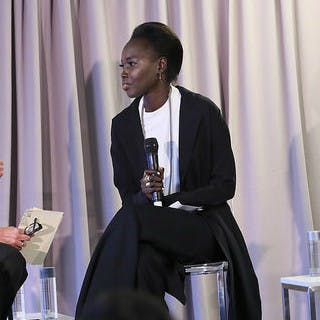
“We were living a good life and we had to start from zero. I had to become a mother at the age of eight to my younger sisters.”
These were the words of Mari Malek, who headlined a United Nations Foundation event this past Friday on the world’s refugee crisis. She is extraordinary in many ways: a woman who has overcome adversity; a renowned supermodel who is using her platform for great purpose; and a member of Kenneth Cole’s Courageous Class of Advocates for social issues. The event
featured experts in the humanitarian sector as well as partners from the private sector and communications world who are helping share stories and realities of displacement.
Approximately 60 million people around the world have been displaced from their homes – an alarming number and the highest level of displacement since World War II. That is why United Nations Secretary-General Ban Ki-moon is hosting the first-ever World Humanitarian Summit from May 23-24 to show solidarity for those in need and to advance action to reduce suffering.
Here are three themes we heard from last week’s event that we should keep in mind as leaders prepared to meet in Istanbul.
We Are All Connected
Empathy is key to talking about and covering the refugee crisis. And the best vehicles for building empathy are not numbers that desensitize the issue, but stories that build a connection with those experiencing displacement. As Stephen Keppel, Vice President of Social Impact at Univision, emphasized, themedia has a responsibility not play on fears that audiences might have. It is up to us to explain this to our audience and give the full picture.
Another great storyteller presenting a new solution was UN Senior Advisor and Filmmaker Gabo Arora, whose work with virtual reality has produced three films thus far. Gabo reminded us that the most compelling stories are those told in the first person, those from the refugees themselves.
The slogan “nothing about us without us” very much applies to refugee crisis, and we need to elevate refugees’ perspectives in our public policy and
messaging. The people we are talking about should have a seat at the table.
Refugees Are Assets to Communities
Serial entrepreneur, angel investor, and President of the Tent Foundation Ruma Bose believes that it is not the responsibility of business to fund the humanitarian budget, but that business has a unique role to play in taking risks and innovating new solutions to the crisis. She and the group called on business to act, saying “We fundamentally believe that [the refugee crisis] is a human problem… We need to all come together and do something.”
Additionally, speakers emphasized the assets refugees bring to communities, from skills to a desire to contribute for economic self-reliance. The global
community must find ways to increase economic and development opportunities for refugees.
We Need to Expand the Response
The humanitarian crisis needs a global solution, according to Shelley Pitterman, head of the UN Refugee Agency office in Washington, D.C. The funding gap for humanitarian response limits the ability to implement projects and to assist refugees. From providing food, water, and jobs to preventing human trafficking and similar heightened risks, this gap must be closed to ensure that a comprehensive and inclusive response can be rendered.
Additionally, we need the private sector, the media, and other partners to expand their engagement in solving this crisis. Speakers noted that the Sustainable Development Goals call for no one to be left behind, an important commitment by all of us to help refugees and displaced people.
We all have a role to play in helping our refugees around the world. It starts by raising awareness and raising your voice. In the words of Mari Malek, “Always use your platform and never let your platform use you.”
To learn more about the conversation, visit our Storify or watch the video of the event.
To learn more about the World Humanitarian Summit, visit worldhumanitariansummit.org.
[Photo: Stuart Ramson for UN Foundation]

